Deep Purple
Albums reviewed on this page: Shades
of Deep Purple, The Book of
Taliesyn, Deep
Purple, Concerto for Group and
Orchestra,
Deep Purple In Rock, Fireball,
Machine Head, Who
Do We Think We
Are, Made in Japan,
Burn,
Stormbringer, Come
Taste the Band.
"I have been born three
times. I know
through meditation" - from "Listen, Learn, Read On"
I originally chose that quote because it showed how utterly
bad
and pretentious early Deep Purple were. Looking at it now, it
applies to the band fairly well, if you ignore their
reunions.
Their first incarnation was as a fairly terrible progressive-rock
band, which scored a lot of initial success in the US, but almost
nothing in the UK. Then after replacing Rod Evans, vocalist
un-extraordinaire and bassist Nick "People Don't Even Remember
Me Because I'm Not Worth Remembering" Simper, the band entered
their golden (metal) era. Guitarist Ritchie Blackmore was a
great classic blues player with his own distinct tone, and new
vocalist Ian Gillan (best known to many for singing the role of Jesus
in the original recording of Jesus Christ Superstar)
could
really belt it out - and then break into his fluctuating vibrato
scream. This is repeated over and over again in the reviews,
so
let's get it out here - organist Jon Lord was good, but never really
did much more than follow in the footsteps of Keith Emerson's work
with the Nice. I
recognize that they
had the same interests music-wise, which is fine, but Lord was never
an innovator. Finally, drummer Ian Paice was pretty
consistent
at keeping it interesting, and Roger Glover - well, he stayed in the
background. This alignment of the players lasted for four
good
albums (Deep Purple In Rock, Fireball,
Machine Head,
Made in Japan, and one bad one (Who Do We
Think We Are).
Is it early metal? Yes, although nobody seemed to notice that
Blackmore was playing straight blues a good portion of the time, and
Lord was being rather classical. But all good things come to
an
end, and the band entered their third phase - that of a concealed,
and then open hard rock band when both Ian Gillan and Roger "People
Remember Me Because I Was Around When The Band Was Successful"
Glover left. It may sound like I'm quibbling between metal
and
hard rock, but believe me there is a difference - the hard rock was
far less technical, and when Deep Purple played it, less interesting
too. The replacements, Coverdale and Hughes were not as
talented at either playing or writing as the men they
replaced.
Blackmore gave (Burn) and gave (Stormbringer),
until he
gave out and then went out (to his own band), and the band recorded
one album (Come Taste the Band) with Tommy Bolin
before
departing to that great arena in the sky. End of story, except for reunions and all.
I'd start with Machine Head, their most
well-known album
from their metal period, and go in ever-widening circles forwards and
backwards from there, although the margins are pretty rough.
Personnel:
Ritchie Blackmore (guitar), Rod Evans
(vocals), Jon Lord (organ), Ian Paice
(drums), Nick
Simper (bass). Evans and Simper
replaced with Ian
Gillan and Roger Glover respectively
after Deep
Purple. David Coverdale (vocals),
Glenn Hughes
(bass) then later replaced them after Who Do You Think We Are.
Blackmore quit after Stormbringer
to form/take over
what became Ritchie Blackmore's Rainbow. Tommy
Bolin then popped in to take his place.
Band split,
1976.
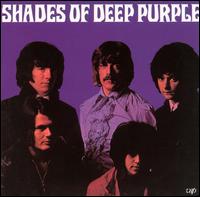 Shades
of Deep Purple (1968), **
Shades
of Deep Purple (1968), **
Deep
in the shrouded mists of time, Deep Purple was a classically-flavored
power-pop band, with an emphasis on the power. Recorded
quickly, Shades of Deep Purple has
all the instrumental ingredients for Deep Purple's later success -
Blackmore's loud blues licks, Lord's classical organ, Paice's rapid
fire drumming. But Shades is still a pop
album, and Rod
Evans seems to be under the delusion he was reared in the American
South, and consequently did some goofy soul vocals (a slow and
overblown cover of the Beatles' "Help" which he sings like
a soul ballad). Despite their name (what's darker than the
blues?), the more blues-oriented tracks seem to be stuck halfway
between Brian Auger-like Swinging London ("And the Address")
and ordinary workouts ("Mandrake Root"). But who
needs slow quasi-classical arrangements of "I'm
So Glad" (complete
with "Prelude: Happiness") or "Hey Joe"
(inexplicably credited to the group) that allow plenty of room for
the group to insert well-known motifs (like Bolero and Malaguena) in
the songs? Warning: Repeated listens may result in you having
a
gun in your hand. Some goofy late 60s
production does
not help matters, like sticking space-age noises between
tracks.
Blackmore does not have his technique worked out yet - he sticks
mainly to whammy bar and doing some Hendrix imitations ("Mandrake
Root") and wah-wah crops up from time to time. He also
contributes one interesting curiosity - a good copy of the Who on
"Love Help Me" built on power chords, and with some
falsetto backing vocals to match Evans' psychedelic lyrics.
Their rip-roaring cover of Joe South's "Hush" is the rare
case where they get it right - loud, not too long, and appropriately
soulful for Evans' vocals to seem well placed. So, Shades
has very little original material, the new songs
are
primarily derivative or without any real substance, and the covers
are not for the faint of heart (despite the intricate
arrangements).
All of that being said, I would still rather listen to this album
than to almost any other two star album. The group's sound is
excellent, but the end to which it was employed is primarily
dreck.
Produced by Derek Lawrence.
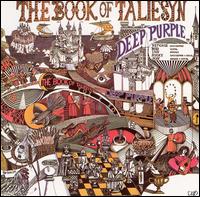 The
Book of Taliesyn (1969), **
The
Book of Taliesyn (1969), **
This
kinda
blows. Deep Purple now trended towards being a progressive
rock
band, and a fairly bad one at that. Rod Evans is still the
singer here, and he tends to sound like soul-shouter Mitch Ryder (of
the Detroit Wheels). So when combined with Lord, a classical
organist, and Blackmore, a really good classically-influenced blues
guitarist, you would not expect the result to be a mess. Oh,
but it is. A big mess. I am pretty sure Evans
writes the
lyrics, which are mystical without meaning anything ("Listen,
Learn, Read On", "The Shield"). There are also
some misguided covers, Neil Diamond's "Kentucky Woman"
(another US hit), a ten+ minute rendition of Phil Spector's "River
Deep, Mountain High," and an extremely odd version of the
Beatles "We Can Work It Out". Minor chords are
everywhere, and I mean everywhere ("Exposition", and
everywhere else), as if they were on clearance at a
music
store. The whole album sounds eerie because of that and some
not-so-hot production, and frankly, the songs suck. The only
halfway decent songs are the guitar and organ blues workout "Hard
Road" (Deep Purple explored this in-depth later), the
instrumental "Exposition" which does not suck, and "Anthem"
with a lesser amount of minor chords, and a nifty fugue
section.
Actually, "Anthem" is pretty much the only original decent
song on the album, and it's not great but has some good classical
bits. Fortunately, nothing is really grating, only
boring.
The reason this gets two stars is because of the good job that
Blackmore does everywhere, and Lord's periodic good flashes amidst a
wasteland. Produced by Derek Lawrence, who should have known
better. Released on the Tetragrammaton label, which was
partially owned by Bill Cosby.
Check out this
from the back of the album: "The Book of Taliesyn is a
representation of seven different feelings with Ritchie, Rod, Ian,
Nicky and Jon, establishing the moods under the spiritual direction
of Taliesyn. The book is not an end in itself, but merely
another link in the chain of musical progression which is evolving as
Deep Purple." Slightly
pretentious, perhaps?
 Deep Purple
(1969),
***
Deep Purple
(1969),
***
A
big improvement. Evans contributes fewer lyrics,
and comes up with something interesting for once (the Rosemary's
Baby
tribute "Why Didn't Rosemary") and sounds like a decent
singer. Instead, Lord is doing the lyrical work, avoiding
mysticism (thank God) and focusing on more "normal"
topics. Deep Purple has only one cover
as well, an
unspectacular version of Donovan's "Lalena". The
really good news is the production - Deep Purple no longer sounds
like poop, but like a real band. The great news is Blackmore
-
he re-discovered the wah-wah pedal and learned the latest
techniques. Deep Purple's main problem is
again the
songs --more misfires, but closer to the mark, which is apparently
the blues ("Blind" is too long and "Chasing Shadows"
gets lost in its own percussion). Lord is not a compelling
soloist either. Lyrically,
"Why Didn't Rosemary" is my favorite track -
a blues song asking why she did not just take the pill, instead of
giving birth to ...uh... (only in 1968, I tell you). However,
"The Painter" and its tape manipulated cohort "Fault
Line" are Blackmore's show - and he is amazing. Just to
remind everyone that they still had progressive aspirations, Lord has
a twelve+ minute "concert" with three movements entitled
"April" at the end. The first part consists of
Blackmore and Lord alone, and is a decent mediaeval instrumental,
followed by a dull orchestral passage (Lord's amateur night at the
Pops), and then to hammer the musical point in, a group rendition
with lyrics. The same musical theme for 12 minutes, and not a
whole lot of solos in there either. Boring. So,
Blackmore
raises this half a star, without him it would be
unremarkable.
Produced by Lawrence again.
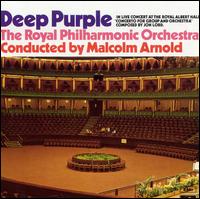 Concerto
for Group and Orchestra (1970), ***1/2
Concerto
for Group and Orchestra (1970), ***1/2
Brace
yourself
- a) I'm to going to make the inevitable comparisons to the Nice,
and b) this album isn't nearly the pretentious train wreck that the
title suggests. This is an almost perfect example of parallel
construction - Five
Bridges and this
album were recorded in consecutive months in 1969. Concerto
came first, but it's not as if the Nice ripped them off or anything,
as it's a lot harder to do that with "classical music" than
a pop trend (Five Bridges was also
commissioned).
Commercially, Concerto was less successful than Five
Bridges, but it was Deep Purple's first charting UK album and
is
a heck of a lot better than Five Bridges in all
respects.
Lord gathered his inspirations from 19th century symphonic composers
and the result is a focused, clear counterpart to film scores of the
thirties and forties (Alfred Newman and friends). He had a
surprising aptitude for catchy little motifs (especially in the First
Movement), a fondness for woodwinds, and crafted some truly
interesting orchestral parts (the creepy beginning to the Second
Movement being a highlight). But the bulk of Concerto
is
given over to the orchestra, the band gets in only three "songs"
with them, but they are good ones (the 5/4 section in first half of
the Second Movement actually approaches astonishing).
Newcomer
Ian Gillan does not get to sing much, but he grabs your attention:
his performance is very much in the Jesus Christ Superstar
mold - not quite belting it out as much as having a fantastic and
large voice. Concerto has room for
soloing, pretty much
split between a really sharp Blackmore, a very churchy Lord, and the
long, but tolerable (if still obnoxious by definition) Paice drum
solo which is the centerpiece of the disappointing Third
Movement.
The pretension factor might seem to be high, but Lord is quick to
disavow it as anything but "an evening which was intended to be,
and in fact ...turned out to be, FUN", compared to the ideas
behind Five Bridges (don't ask). Of
course, most rock
fans are going to hate having to sit through the orchestration, no
matter how well scored it is. But for the dozen or so people
worldwide who enjoy film scores and rock music,
well they're
going to have a great time. Full Title is Deep
Purple/The
Royal Philharmonic Conducted by Malcolm Arnold In Live Concert at the
Royal Albert Hall: "Concerto for Group and Orchestra,"
composed by Jon Lord.
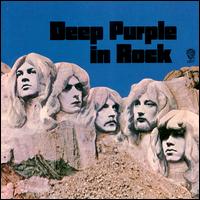 Deep
Purple In Rock (1970), ***
Deep
Purple In Rock (1970), ***
The
title
pretty much says it all - In Rock is where Deep
Purple laid
down their blueprint for their long string of successes. That
blueprint? Ditch the progressive stuff, distort Blackmore's
guitar and Lord's organ, and then have them duel it out over riffs
and power chords. The flaw in this plan is that Lord is by
far
the weaker of the two soloists - being more of a foil for Blackmore
than an actual competitor. He sounds like a church organist
possessed by a devil, but neither an overly talented devil or church
organist. The result is that Lord sounds like he never met a
minor scale he didn't like, and he threw little classical twirls into
his playing ("Speed King" where he plays like an evil Ray
Manzarek). On the other hand, Blackmore emerged as a fully
developed player with all the tricks - string scraping ("Hard
Lovin' Man"), triplets ("Flight of the Rat"), and
fantastic note bending almost everywhere, and making Lord's playing
pale in comparison. Ian Gillan was probably the best
front-man
in early metal, not only could he sing full-throated, but his
trademark is a sort of screaming operatic falsetto. If Lord
sounds like he was possessed, Gillan sang like he was trying to
convince us that he was also under the influence. Finally,
Ian
Paice also deserves praise because he kept things interesting, even
during a drum solo ("Flight of the Rat"), without being
overly flashy or anything. When combined, the set of bluesy
songs has a classical influence, and fortunately do not all rely on
riffs either. But the songs are have pretty much the same
production, and, despite the excellence of playing, tend to be
indistinguishable from each other in the long run. The only
real exception is "Child In Time," which is well
constructed and justifies its length (over ten minutes).
Also,
In Rock's the lyrics are not great, but
serviceable.
This album gets hailed as a landmark of early metal, but it is really
more of a signpost for things to come, due to the lack of memorable
tunes. Produced by the group.
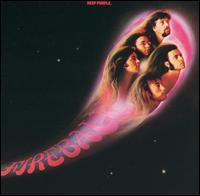 Fireball
(1971), ***1/2
Fireball
(1971), ***1/2
A
real
improvement because Deep Purple realized they needed songs to go
along with their impressive playing. Enter hooks, and, as an
added bonus, production to distinguish each track. Of course,
this is all at the expense of soloing time, but it is worthwhile
tradeoff (the title track which is immensely catchy, despite the dud
of a guitar solo). Fireball has the same
enjoyable
bluesy metal sound, but the band was much more trashy than menacing
this time ("Strange Kind of Woman" which is a trashy
delight) with something to listen to in almost every track ("No
No No" which is a weaker song contains a fantastic bass
line).
In terms of solos, Lord lost time to all manners of production tricks
and tones (organ feedback, backwards organ, droning for both on "The
Mule", odd Peter
Banks-like
solo in
"Fools"). The result is a different feeling of
arranging or production for every track. But they manage to
botch it up big time in two cases. The first is "Anyone's
Daughter" which sounds very un-Deep Purple with its light,
down-home sound (Lord on honky-tonk piano), and absolutely atrocious
lyrics. Here are a few samples-
on
a lack of suitable grocers, I suppose:
I won't get no more eggs and water
Now I've laid the farmer's daughter
poor
dietary concerns:
I
stood under your bedroom window
Throwing up a brick
or
the epitome of awkward phrasing:
You
say I'm dumb and scraggy
But
man this dumb and scraggy is
Your
daughter's baby's daddy
If Ernest
Hemingway had not already shot himself, he would have upon hearing
that last bit. The lyrics completely negate the rough charm
of
the music. The other bummer is the jokey "No One Came,"
which I have to imagine is a semi autobiographical song about
Gillan's lack of success as a singer. Thank goodness he did
not
write a subsequent song about his lack of success as a
lyricist.
But still, Fireball shows the band branching out
and trying
new things, most of which work. On the whole, it is well
written, well played (even Lord), and well produced (by the band).
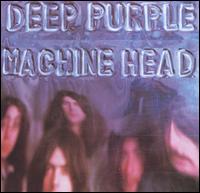 Machine
Head (1972), ****1/2
Machine
Head (1972), ****1/2
Not really anything new, it was just where all the good elements
floating around Deep Purple's prior albums coalesced. While In
Rock menaces and Fireball is hard,
this album fuses the two. That is, it sounds like the former, but has
the quality production and songs of the latter. Machine Head
is considered an early metal classic, however many of the songs are
more hard rock ("Never Before" which points the way to
cock-rock like Aerosmith) or just heavy blues ("Maybe I'm a
Leo", "Lazy"). Only one song sounds like real
metal, the downright threatening "Space Truckin'".
But the riffs that were substandard and plagued their prior albums
are upgraded here, led with their signature tune "Smoke on the
Water," a song about the burning of Zappa's hotel (of all
things). The songs are well written and self-arranged , with
good bridges to keep up our interest ("Never Before" has a
strange one that sounds like late period Beatles). Blackmore
spits out lead after impressive lead ("Highway Star"), many
of them his usual straight blues lines. Also note his
throbbing
rhythm lines during many songs - a technique used by metal bands to
this day. Even Lord has his moments - a lightning fast solo
in
"Highway Star" and another possessed church organist intro
to "Lazy". Only a few tracks are weaker ("Maybe
I'm a Leo" and "Pictures of Home"), but Machine Head
is so well done that these spots are not albatrosses. The
only
other complaint is that Paice seems to have toned his playing down on
the album, but that is only a minor issue. A hard rock (or
early metal) classic. Self-produced.
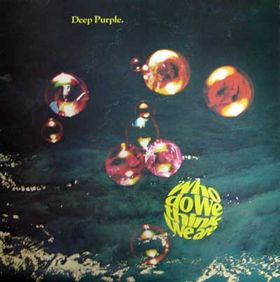 Who Do We
Think We Are (1973), **
Who Do We
Think We Are (1973), **
For
reasons I have not investigated, Deep Purple decided to dumb down
their sound and lyrics. Who Do We Think We Are sounds
like the band was covering themselves, with the main difference being
the addition of popular touches like boogie or glam-rock ("Mary
Long" sounds a lot like "Farmer's Daughter" for
example, before it trails off into an Indian trance with jazz
drumming). All in all, this album was an attempt to make them
sound more like Slade,
but without any substance. "Rat Bat Blue" is an
excellent demonstration of this - the words are pronounced "rat
bat baloo" resulting a catchy rhythm, Kipling
fans' ill-will, and not much else.
The menace is
present, but not only is it something we heard before, it is watered
down besides ("Smooth Dancer"). Gone also are some of
the nice arrangement touches like outros and intros, as well as
extended solos. The band's supply of production tricks has
also
begun to run low, so we get phased drums ("Super Trooper")
and cruddy non-Gillan backing vocals in a couple of spots.
But
the most surprising aspect is the overt boogie nature of plenty of
the songs, reinforced by Lord's piano work. Even the latest
offering from their long line of big, meaty songs ("Woman From
Tokyo") is the weakest one to this point, featuring an actually
pretty interlude before sliding into boogie territory.
Blackmore is around but his talents are wasted, while Lord is
harmless when he is not blatantly ripping off Nice-era
Emerson (the solid "Our Lady"). As might be expected,
the lyrics have also taken a turn for the worse as well. The
only real stinker in the lot is the traditional blues of "Place
In Line" with some wince worthy vocals from Gillan and inane
lyrics. In summary, this album goes where Deep Purple had
gone
before, except in a derivative manner. Self-produced.
Oh, and who do
they think they are? Judging by the gatefold sleeve, which
consists of mostly favorable press clippings, they consider
themselves to be talented and unheralded. My favorite reads:
"Thank goodness the group are not 'serious' about rock music; I
can't bear pretension
when it's based on
limited
talent."
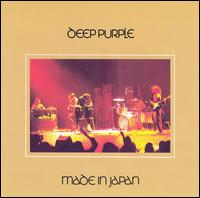 Made
in Japan (1973), ****
Made
in Japan (1973), ****
An
immaculately recorded double-live album recorded over a few days the
previous summer. If there ever were any doubts about whether
Deep Purple's skills transferred from the studio to the stage, Made
in Japan erases them. A wisely chosen set focusing
on
extended renditions of some riff-based songs might spell doom for
many other bands, but here every member of the band shines.
Blackmore is astounding; not only does turn out his usual
high-quality fluid blues playing, but his versatility is far greater
- string scraping, power chords, whammy bar abuse - he is the real
deal. For all of my complaining, Lord shows himself to be, if
not a standout soloist, then a valuable supporting player who manages
to squeeze quality into his own solo spots. Whatever his
shortcomings in the studio, they do not appear here. At one
point I thought I might have been listening to Thirds-era
Soft
Machine, as an extreme example (the descending spaceship intro to
"Lazy"). Paice is, well, his usual excellent self -
changing his rhythms to maintain your interest, and otherwise being
talented. Even Glover seems to have it going as well, although he is
at the bottom of the mix. Which brings us, finally, to Ian
Gillan, who despite being early metal's best singer, does not quite
get the space the instruments do. Sure, he gets to showcase
his
amazingly high screaming/singing in a call and response with
Blackmore ("Strange Kind of Woman"), but for the most part
Blackmore lets his fingers do the talking. How do Deep Purple
maintain the audience's interest when so many of their songs could
potentially sound the same? Do them in slightly different
styles. Thus, both "Lazy" and "Child In Time"
are feature a jazz-blues style in them, as if this were recorded
during the British Blues Boom (think a very, very good Ten Years
After). Plus, they provide me another opportunity to bludgeon
one of my points in again - "Space Trucking" goes on for a
full side (of an LP) a lot of which sounds exactly
like late
period Nice.
Specifically, "Rondo", right down to the bass line and
organ feedback. While Lord may not have Emerson's technical
skills, he is a hell of a lot easier to listen to, especially
live.
There are only a few dry spots on the whole double-LP set - a long
drum solo from Paice ("Mule", most of the original track
winds up in "Space Trucking"), the aforementioned call and
response session, and few other soft patches here and there.
On
the whole, very well played, and certainly one of early metal's
finest moments.
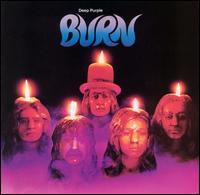 Burn
(1974), **1/2
Burn
(1974), **1/2
Well,
Deep Purple managed to loose their lead singer and bassist a
second time. Needless to say, this
time the
replacements were not of the same (or better) caliber. The
future Whitesnake frontman David Coverdale is not bad, but he was the
classic big voice + over-emoting hard rock frontman. Fellow
newcomer Glenn Hughes was a more precise bassist than Glover with
little runs here and there, and boasts his own middling gruffy voice
here and there. It is really sad to see what happens when the
riffs run dry ("Might Just Take Your Life" is the best and
it's only decent), and the studio gimmicks have all been used up on
previous albums. The answer? Well, you devolve into
hard
boogie, with your vocalist sounding like he receives "soul"
in a cardboard box via mail order - it's cheap and slathered on
liberally (the aptly named spotlight track "Mistreated"
which drags on for over seven minutes). Sure, Blackmore is
still unmistakable (the title track) and a reduced Lord attempts to
compensate by buying some synths (the boring prog-rock instrumental
"A 200"), but it is not enough. Not even a return to
Montreaux, where Machine Head was recorded, really
helped.
At the end of the day, Burn is all pretty
derivative ("You
Fool No One" borrows its beat from "Whisky
Train" and
it's vocals from Cream's "I Feel Free", and there is some
back catalog cannibalization as well) and when you find yourself
being compared to Bobby Tench (this means you, David Coverdale) it is
not good. All of that being said, Burn
is far better than their last studio album, and is fairly
decent as mechanical rockers ("Sail Away") or guitar-based
rock goes ("Lay Down Stay Down"). If you had never
heard their previous work this might sound far better, but I cannot
forget the past. Boogie - where good metal bands go to
die.
Most of the songs are group efforts, minus Hughes.
This
did mark the end of the period where the entire group was credied for
every song. Self-Produced.
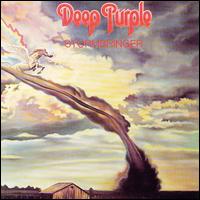 Stormbringer
(1974), *1/2
Stormbringer
(1974), *1/2
Deep
Purple's identity is submerged in this album of bluesy hard
rock.
Stormbringer is so bad that it is hard to take this
stuff
seriously. OK, there are a couple of attempts at old-style
riffs (the title track which seems to be able evil clouds, and "Lady
Double Dealer") but the lyrics are so
terrible. It
is just a standard exercise in male bravado and arena rock.
Stormbringer is oversung ("Love Don't Mean a Thing"
has Coverdale slobbering like a demented Stevie Wonder, but it's
everywhere) and underplayed by Blackmore. He does show
flashes
of his former style while focusing on slide work, so he sounds like
an impersonator rather than the real deal. Well, someone has
to
come up with music to be played during strip club scenes in bad
movies. Really, this is what male high-school students in the
70s would enjoy while drinking Pabst, and complaining about
women.
How can anyone take a song like "High Ball Shooter" with a
straight face? The chorus has the lines of "High ball
shooter / You sure ripped the low ones off me", and that's only
one example. Utterly ridiculous, as if recording one bleh
album
in a year was not enough. Great Taste/Less Filling?
Let's
try (Leaves a) Bad Taste/All Filler. The one and a half star
rating? Simply because it's so bad it's entertaining in an
unintended manner. I am not surprised that this hit the top
ten
in the UK - Deep Purple was a bankable commodity at this
point.
The songs were written by various combinations of group members, with
Coverdale being the only one consistently credited. I would
guess he was responsible for the lyrics. Entertainment wise
it
rates higher, but only because it is so terrible. Produced by
Deep Purple and Martin Birch.
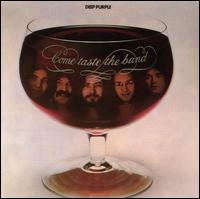 Come
Taste The Band (1975), ***
Come
Taste The Band (1975), ***
Let's
face it - no matter how fast Blackmore may have soloed, Deep Purple
ceased to be a metal band with Burn. The
guitarist quit
after Stormbringer, and the band recruited James
Gang member
Tommy Bolin to take Blackmore's spot. In actuality what this
openly admits that the band had become s a hard rock band, and that
is far from a bad thing. Sure, "Love Child" opens
with a passage that sounds like vintage Sabbath + organ, but it's
really not much more than lip service to the past. Bolin was
a
good guitarist, and one who was a hell of a lot more suited to the
other side of the thin line between hard rock and metal. His
slide work is far better than Blackmore's, and while he did not have
his predecessor's speed, he wasnot exactly Johnny Slowfingers
either. I think Blackmore was just burned out, playing-wise
and
in the songwriting department. Bolin co-wrote most of the
tracks and has a nice guitar spotlight number ("Owed to 'G'"),
but I think he sparked the other members as well. Come
Taste
the Band has plenty of genuinely decent moments even on bad
tracks, like the creepy intro to "You Keep On Moving." It
also does not hurt that the vocals are pushed down in the mix a
touch, although we do get hit with the double whammy of both
Coverdale and Hughes at least once. But this post-Blackmore
era
tries something which I cannot see Ritchie going along with - the
rhythm section gets downright funky on some tracks ("I Need
Love", "Lady Luck"), as Paice plays a swooshing 1-2
beat and Hughes drops his mechanical bassist schtick. Who
knew
it could be this easy to sound much better? Lord even
contributes a nice piano song with synths taking the place of the
rest of the band, even though it only allows Bolin to openly ape
Stevie Wonder ("This Time Around"). There are the
usual lyrically indulgent minefields ("Gettin' Tighter"
about the band), and Coverdale's usual lamenting about gambling and
being a displaced person ("Dealer", "Drifter").
This shows a band that had promise album, even more so given that the
entire thing was written and recorded in a month. I am even
sorry they broke up afterwards. Produced by the band and
Martin
Birch.
Made In
Europe (1976)
Live.
I don't own this, and reputedly it's far inferior to it's similarly
titled predecessor.
The band reunited, etc. later.
I
wantcha, I need ya ...back on the Music Page.
 Shades
of Deep Purple (1968), **
Shades
of Deep Purple (1968), **
 The
Book of Taliesyn (1969), **
The
Book of Taliesyn (1969), **

 Concerto
for Group and Orchestra (1970), ***1/2
Concerto
for Group and Orchestra (1970), ***1/2
 Deep
Purple In Rock (1970), ***
Deep
Purple In Rock (1970), ***
 Fireball
(1971), ***1/2
Fireball
(1971), ***1/2
 Machine
Head (1972), ****1/2
Machine
Head (1972), ****1/2

 Made
in Japan (1973), ****
Made
in Japan (1973), ****
 Burn
(1974), **1/2
Burn
(1974), **1/2 Stormbringer
(1974), *1/2
Stormbringer
(1974), *1/2
 Come
Taste The Band (1975), ***
Come
Taste The Band (1975), ***